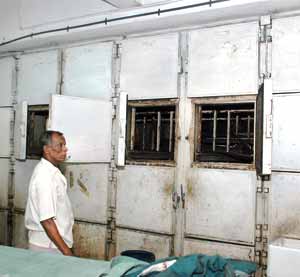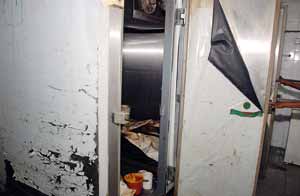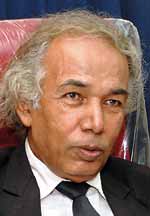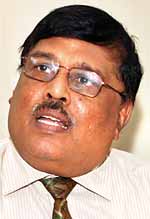Nightmare conditions prevail at morgues in the city and elsewhere, reports Nadia Fazlulhaq
Unclaimed bodies piling up. The air thick with the stench of decomposing bodies. Rats chewing on corpses.
 |
| Some of the freezers have been out of service for seven years. Pix by M.D. Nissanka |
This is not a nightmare scene from a horror movie or a lurid description taken from a ghoulish H. P. Lovecraft novel or a creepy Edgar Allan Poe short story. It is the grim reality at hospital morgues in Colombo – and in other parts of the country.
Corpses are brought daily for post-mortems to the Institute of Legal Medicine and Toxicology, also known as the Colombo Judicial Medical Office. Only 20 bodies can be stored at a time in the morgue’s freezers (coolers), which would normally accommodate up to 60 bodies. This is because most of the freezers are not functioning. Some have been out of service for as much as seven years. Meanwhile, bodies are left in coolers that do not work.
Although the Ceylon Electricity Board receives monthly payments from the Colombo Judicial Medical Office, the CEB’s refrigeration unit has stopped extending maintenance services. “We lack basic morgue and laboratory facilities, even proper sanitation,” says Dr. Ananda Samarasekare, Colombo’s Chief Judicial Medical Officer (JMO). “We lack protective devices to handle bodies. Some of us do not even have aprons or gowns to conduct post-mortems. This is the main reason medical professionals are reluctant to enter medical legal services. There is an acute shortage of JMOs.”
 |
| Colombo’s Chief Judicial Medical Officer says they lack basic morgue, laboratory facilities, proper sanitation and protective decvices to handle bodies |
The unclaimed bodies include nameless persons without family or friends, destitute and homeless persons, road accident victims, elderly persons, and suicide cases. “Our refrigerators are overloaded with bodies,” Dr. Samarasekare continues. There is no proper disposal. Very often, the contractor hired by the Colombo Municipal Council refuses to do the job, saying the CMC is not paying them for the disposal of bodies.”
Bodies left to decompose invariably attract vermin. “The Colombo Municipality should be sending exterminators to take care of the rats,” Dr. Samarasekare says. “The morgue is full of rats, ants and flies.”
Morgue storage shortcomings and the lack of a system for the proper disposal of bodies are problems not limited to Colombo. It is the same situation at outstation hospitals.
 |
| Colombo City Coroner Edward Ahangama |
 |
| Dr. Ananda Samarasekare, Colombo’s Chief Judicial Medical Officer |
Kurunegala Teaching Hospital JMO Dr. S. M. H. M. K. Senanayake says only a few of the main hospitals have morgue facilities, and these receive a large number of bodies from peripheral hospitals.
Kandy Teaching Hospital deputy director Dr. Susil Siriwardena says it sometimes months before someone comes to fix a non-functioning morgue coooler. “One problem is the delay in tender procedures for maintenance,”he tells the Sunday Times.
There are times when hospitals have to turn away bodies brought in from other hospitals.“Our hospital reports an average 20 deaths a day,”Dr. Siriwardena says. “The morgue can hold up to 20 bodies. The health authorities should allocate more funds for our work.”
Here, too, the Electricity Board is not looking into maintenance, even though CEB bills are paid.
A shortage of consultant judicial medical officers and a lack of morgue facilities often means that a body must undergo the indignity of being transported long distances before it is finally laid to rest. It is not uncommon for grieving families coming to hospitals in Vavuniya, Mullaitivu and Jaffna to be told to take the bodies to hospitals as far away as Polonnaruwa.
Recently, because of a breakdown in the morgue cooling system at Mahiyanganaya Base Hospital, the body of a 15-year-old girl had decomposed to the point that the family could hardly recognise the deceased when the body was handed over for burial.
Colombo City Coroner Edward Ahangama says allowing bodies to decompose in this way was a violation of a human’s basic rights.
The Sunday Times brought up the matter with Dr. Ravindra Ruberu, Secretary to the Ministry of Health. He said the Ministry was aware of the problems and that many complaints had been received.
“The Ministry intends to upgrade the system, but funds are an issue.” Dr. Ruberu said. “The first step would be to fix what can be fixed. We will be speaking to the Electricity Board about repairing the freezers.
“Hospitals run by local authorities most of the time haven’t the funds to maintain coolers. The costs run into the millions,” Dr. Ruberu said. “All the new hospital projects will include well-equipped morgues. But this will take a few years.” |





